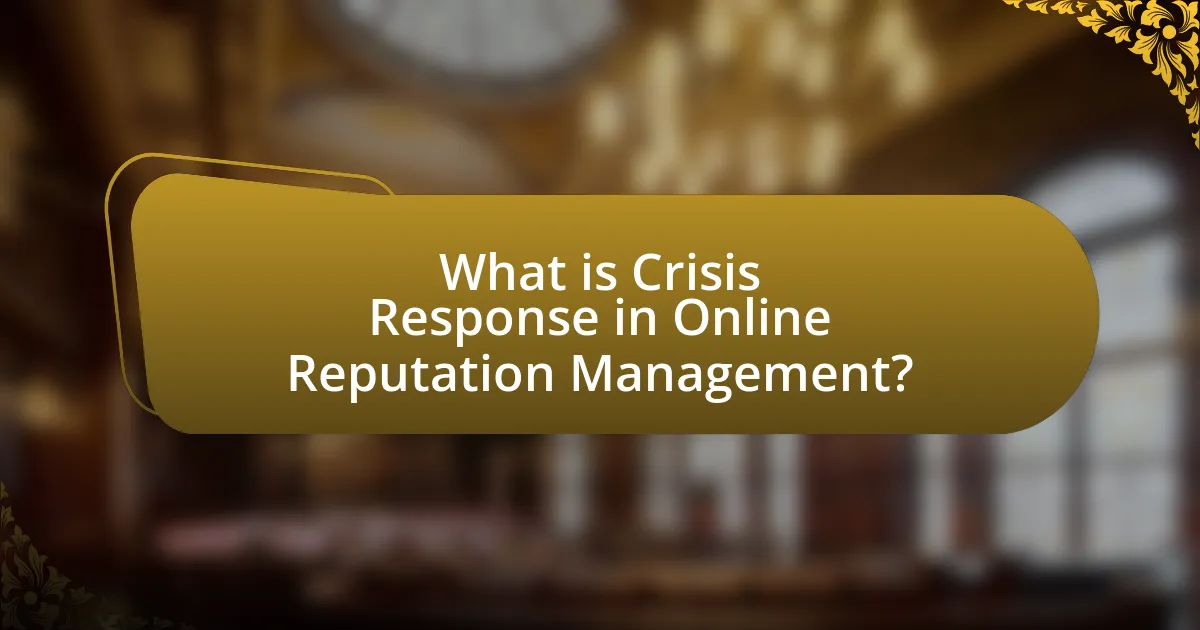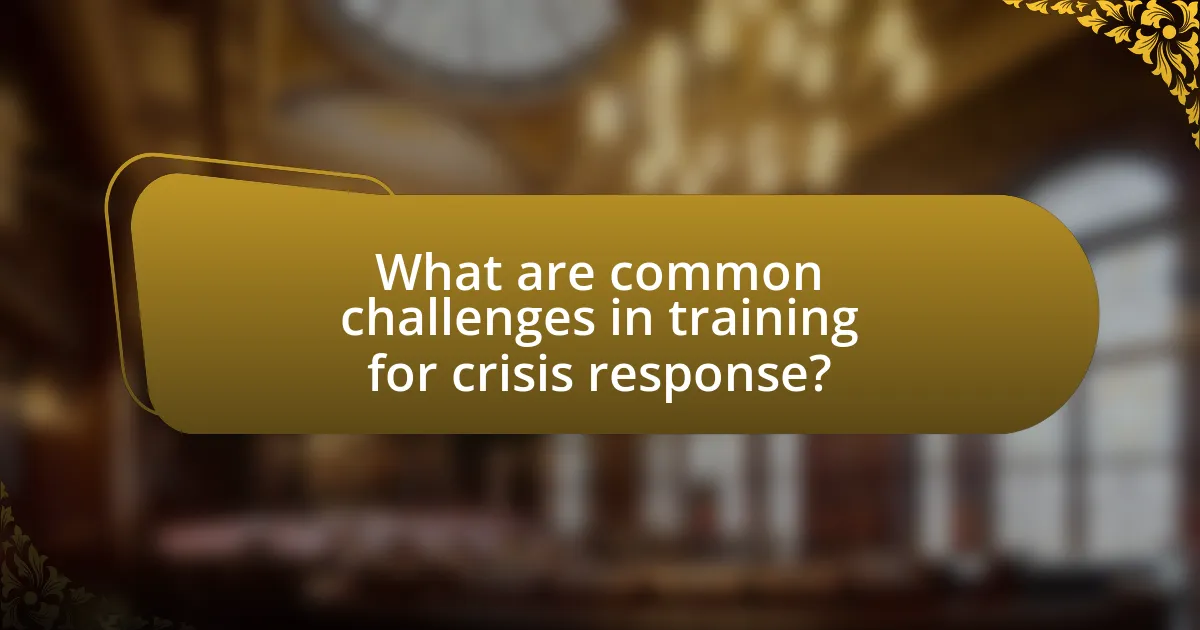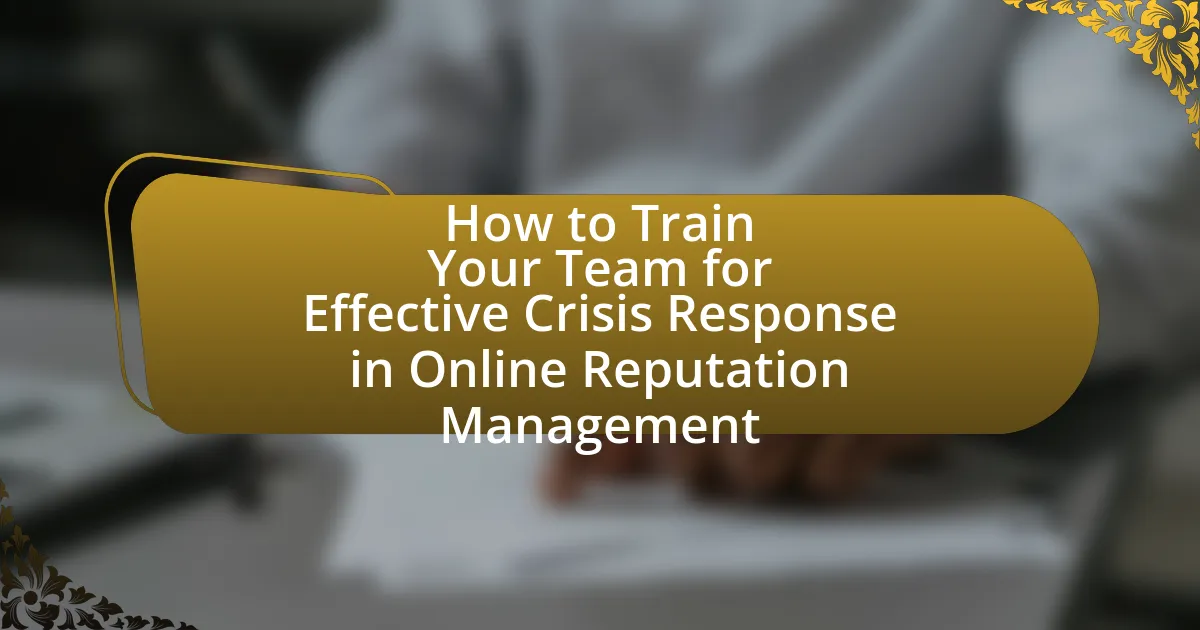Crisis response in online reputation management involves strategic actions to address negative publicity and restore trust in individuals or organizations. This article outlines the significance of timely communication, effective training, and key elements of a crisis response strategy, emphasizing the impact of these factors on maintaining a positive online reputation. It discusses the importance of developing essential skills within teams, utilizing simulation-based training methods, and assessing training effectiveness through various metrics. Additionally, it highlights common challenges in crisis training and offers practical tips for enhancing crisis response capabilities, ultimately aiming to equip organizations with the tools necessary for effective crisis management.

What is Crisis Response in Online Reputation Management?
Crisis response in online reputation management refers to the strategic actions taken to address and mitigate negative publicity or damaging information about an individual or organization. This process typically involves monitoring online mentions, assessing the impact of the crisis, and implementing a communication strategy to restore trust and credibility. Effective crisis response is crucial, as studies show that 70% of consumers are influenced by online reviews and reputation, highlighting the need for timely and effective management of negative situations.
How does crisis response impact online reputation management?
Crisis response significantly impacts online reputation management by determining how effectively an organization can mitigate negative perceptions during a crisis. A timely and transparent response can help restore trust and credibility, while a poor response can exacerbate damage and lead to long-term reputational harm. For instance, a study by the Institute for Public Relations found that organizations that respond quickly to crises can reduce negative sentiment by up to 50%. This demonstrates that effective crisis management is crucial for maintaining a positive online reputation.
What are the key elements of an effective crisis response strategy?
An effective crisis response strategy includes clear communication, rapid response, stakeholder engagement, and a well-defined action plan. Clear communication ensures that accurate information is disseminated to all relevant parties, minimizing misinformation and confusion. Rapid response is critical; studies show that organizations that respond within the first hour of a crisis can significantly mitigate damage. Stakeholder engagement involves identifying and addressing the concerns of affected parties, which fosters trust and transparency. A well-defined action plan outlines specific steps to be taken during a crisis, ensuring that team members know their roles and responsibilities. These elements collectively enhance an organization’s ability to manage crises effectively and protect its reputation.
How does timely communication influence crisis management?
Timely communication significantly enhances crisis management by ensuring that accurate information is disseminated quickly to all stakeholders. This rapid flow of information helps to mitigate misinformation and reduces panic, allowing organizations to maintain control over the narrative. For instance, during the 2010 BP oil spill, timely updates from the company were crucial in managing public perception and stakeholder trust, as studies show that organizations that communicate effectively during crises can recover their reputations more swiftly.
Why is training essential for effective crisis response?
Training is essential for effective crisis response because it equips team members with the necessary skills and knowledge to handle emergencies efficiently. Well-structured training programs enhance decision-making, improve communication, and foster teamwork during high-pressure situations. For instance, a study by the International Association of Emergency Managers found that organizations with regular crisis management training experienced a 30% reduction in response time during actual crises. This demonstrates that training not only prepares teams to respond swiftly but also increases their confidence and effectiveness in managing crises, ultimately protecting the organization’s reputation.
What skills should team members develop for crisis situations?
Team members should develop skills in communication, problem-solving, emotional intelligence, and adaptability for crisis situations. Effective communication ensures that information is conveyed clearly and promptly, which is crucial during a crisis. Problem-solving skills enable team members to analyze situations quickly and devise actionable solutions. Emotional intelligence helps individuals manage their own emotions and understand the feelings of others, fostering a supportive environment. Adaptability allows team members to adjust to rapidly changing circumstances, ensuring that the team can respond effectively. These skills collectively enhance a team’s ability to manage crises efficiently and maintain a positive online reputation.
How does training improve team confidence during a crisis?
Training enhances team confidence during a crisis by equipping members with the necessary skills and knowledge to respond effectively. When teams undergo crisis training, they learn specific protocols, communication strategies, and problem-solving techniques that prepare them for real-life scenarios. Research indicates that organizations with well-trained teams experience a 30% increase in confidence levels during crises, as team members feel more competent and capable of handling unexpected challenges. This preparedness reduces anxiety and fosters a sense of unity, enabling teams to act decisively and collaboratively when faced with a crisis.

How can you effectively train your team for crisis response?
To effectively train your team for crisis response, implement a structured training program that includes scenario-based simulations, clear communication protocols, and regular feedback sessions. Scenario-based simulations allow team members to practice their responses to various crisis situations, enhancing their decision-making skills under pressure. Clear communication protocols ensure that all team members understand their roles and responsibilities during a crisis, which is crucial for coordinated efforts. Regular feedback sessions provide opportunities for team members to reflect on their performance and improve their strategies. Research shows that organizations with well-trained crisis response teams can reduce the impact of crises by up to 50%, highlighting the importance of comprehensive training in maintaining a positive online reputation.
What training methods are most effective for crisis response?
Simulation-based training methods are the most effective for crisis response. These methods immerse participants in realistic scenarios that mimic potential crises, allowing them to practice decision-making and communication under pressure. Research indicates that simulation training enhances retention of information and improves team coordination during actual crises, as evidenced by a study published in the Journal of Business Continuity & Emergency Planning, which found that organizations employing simulation exercises reported a 30% increase in crisis management effectiveness compared to those using traditional training methods.
How can role-playing scenarios enhance crisis response training?
Role-playing scenarios enhance crisis response training by providing realistic, immersive experiences that allow participants to practice decision-making and communication under pressure. These scenarios simulate actual crisis situations, enabling team members to develop critical skills such as problem-solving, teamwork, and emotional resilience. Research indicates that experiential learning, like role-playing, significantly improves retention of information and skills, as participants engage actively rather than passively absorbing content. A study published in the Journal of Business Communication found that role-playing exercises increased participants’ confidence and preparedness in handling real-life crises, demonstrating their effectiveness in training programs focused on crisis management.
What resources are available for developing training programs?
Resources available for developing training programs include online learning platforms, instructional design software, and industry-specific training materials. Online learning platforms such as Coursera and Udemy offer courses tailored to crisis management and online reputation strategies, enabling teams to learn at their own pace. Instructional design software like Articulate 360 and Adobe Captivate allows organizations to create customized training modules that address specific needs in crisis response. Additionally, industry-specific training materials, including case studies and best practice guides from reputable sources like the Public Relations Society of America, provide concrete examples and frameworks that enhance the training experience. These resources collectively support the development of effective training programs for crisis response in online reputation management.
How can you assess the effectiveness of your training program?
To assess the effectiveness of your training program, implement a combination of pre- and post-training evaluations, participant feedback, and performance metrics. Pre-training assessments establish a baseline of knowledge and skills, while post-training evaluations measure knowledge retention and application. Participant feedback provides insights into the training experience and areas for improvement. Performance metrics, such as response times and resolution rates during crisis simulations, quantitatively demonstrate the impact of training on real-world scenarios. Research indicates that organizations utilizing these assessment methods see a 30% improvement in crisis response effectiveness, highlighting the importance of structured evaluation in training programs.
What metrics should be used to evaluate training success?
To evaluate training success in crisis response for online reputation management, key metrics include knowledge retention, skill application, participant engagement, and post-training performance. Knowledge retention can be assessed through pre- and post-training assessments, which measure the increase in understanding of crisis management concepts. Skill application is evaluated by observing real-time responses during simulated crisis scenarios, ensuring that team members can effectively implement learned strategies. Participant engagement can be gauged through feedback surveys that assess satisfaction and perceived relevance of the training. Finally, post-training performance metrics, such as response time and resolution effectiveness during actual crises, provide concrete evidence of the training’s impact on operational outcomes. These metrics collectively ensure a comprehensive evaluation of training effectiveness.
How can feedback from team members improve future training?
Feedback from team members can significantly enhance future training by identifying specific areas for improvement and tailoring content to meet the team’s needs. When team members provide insights on training effectiveness, they highlight gaps in knowledge or skills that may not have been addressed, allowing for a more focused approach in subsequent sessions. For instance, a study by the American Society for Training and Development found that organizations that actively seek feedback from employees see a 14% increase in training effectiveness. This data underscores the importance of incorporating team feedback to refine training programs, ensuring they are relevant and impactful for crisis response in online reputation management.

What are common challenges in training for crisis response?
Common challenges in training for crisis response include inadequate scenario-based training, lack of real-time communication skills, and insufficient understanding of social media dynamics. Inadequate scenario-based training limits the ability of team members to respond effectively under pressure, as they may not have practiced realistic crisis situations. Lack of real-time communication skills can lead to miscommunication and delays in response, which are critical during a crisis. Additionally, insufficient understanding of social media dynamics can hinder the team’s ability to manage online reputation effectively, as they may not grasp how information spreads and how to engage with the audience appropriately. These challenges can significantly impact the overall effectiveness of crisis response efforts.
How can you overcome resistance to crisis training among team members?
To overcome resistance to crisis training among team members, it is essential to communicate the importance and relevance of the training clearly. Engaging team members by illustrating how crisis training directly impacts their roles and the organization’s success can foster buy-in. For instance, studies show that organizations with effective crisis management training experience 30% less reputational damage during crises, highlighting the tangible benefits of preparedness. Additionally, involving team members in the training design process can increase their investment and reduce resistance, as they feel their input is valued.
What strategies can help in fostering a culture of preparedness?
To foster a culture of preparedness, organizations should implement regular training sessions that simulate crisis scenarios. These training sessions enhance team members’ skills and confidence in handling real-life situations, as evidenced by studies showing that organizations with regular crisis drills experience a 30% reduction in response time during actual events. Additionally, establishing clear communication channels and protocols ensures that all team members understand their roles and responsibilities, further reinforcing preparedness. Engaging employees in continuous learning and feedback loops also cultivates an environment where preparedness is prioritized, leading to improved overall crisis management effectiveness.
What are the best practices for ongoing crisis response training?
The best practices for ongoing crisis response training include regular simulations, continuous feedback, and updating training materials based on recent incidents. Regular simulations allow teams to practice their response in realistic scenarios, enhancing their preparedness. Continuous feedback from these exercises helps identify areas for improvement, ensuring that team members learn from each experience. Additionally, updating training materials based on recent incidents keeps the training relevant and aligned with current best practices, as evidenced by organizations that have successfully navigated crises by adapting their training to reflect new challenges and lessons learned.
How often should crisis response training be conducted?
Crisis response training should be conducted at least annually. Regular training ensures that team members remain updated on best practices and protocols, which is crucial for effective crisis management. Research indicates that organizations that conduct training sessions annually are better prepared to handle crises, as they reinforce skills and knowledge, leading to quicker and more effective responses during actual events.
What role does continuous learning play in crisis management?
Continuous learning is essential in crisis management as it equips teams with the knowledge and skills necessary to adapt to evolving challenges. In the context of online reputation management, continuous learning enables team members to stay updated on best practices, emerging technologies, and changing consumer behaviors. For instance, organizations that implement regular training sessions and simulations can improve their response times and decision-making processes during crises, as evidenced by a study from the Harvard Business Review, which found that companies with ongoing training programs experienced a 30% reduction in crisis response time. This proactive approach fosters resilience and enhances the overall effectiveness of crisis management strategies.
What practical tips can enhance your team’s crisis response capabilities?
To enhance your team’s crisis response capabilities, implement regular training simulations that mimic real-life scenarios. These simulations allow team members to practice their roles, improve communication, and develop quick decision-making skills under pressure. Research by the Harvard Business Review indicates that organizations that conduct crisis simulations are 30% more effective in managing actual crises compared to those that do not. Additionally, establish clear communication protocols to ensure that all team members understand their responsibilities and can relay information swiftly and accurately during a crisis.
How can simulations be used to prepare for real-life crises?
Simulations can be used to prepare for real-life crises by creating realistic scenarios that mimic potential crisis situations, allowing teams to practice their responses in a controlled environment. This method enhances decision-making skills, improves communication, and fosters teamwork under pressure. For instance, a study by the National Center for Disaster Preparedness found that organizations that engaged in simulation training reported a 30% increase in their crisis response effectiveness. By experiencing simulated crises, teams can identify weaknesses in their plans and refine their strategies, ultimately leading to better preparedness when actual crises occur.
What tools can assist in managing online reputation during a crisis?
Tools that can assist in managing online reputation during a crisis include social media monitoring platforms, review management software, and crisis communication tools. Social media monitoring platforms like Hootsuite and Brandwatch enable organizations to track mentions and sentiment in real-time, allowing for swift responses to negative comments. Review management software, such as Trustpilot and Google My Business, helps businesses manage customer feedback and respond to reviews effectively, which is crucial during a crisis. Crisis communication tools like Slack and Microsoft Teams facilitate internal communication, ensuring that teams can coordinate their responses efficiently. These tools collectively enhance an organization’s ability to monitor, respond, and manage its online reputation effectively during challenging situations.

Leave a Reply